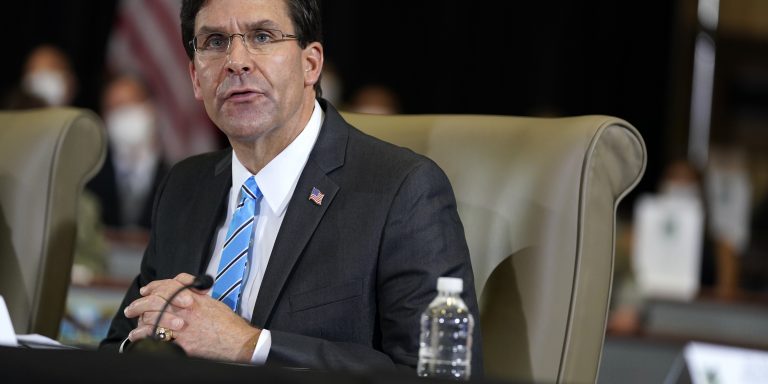INTELBRIEF
November 19, 2020
IntelBrief: Trump’s Purge of Top Defense Officials Endangers U.S. National Security

Bottom Line Up Front
- While still refusing to acknowledge his election loss, President Trump made significant personnel changes at the Pentagon in recent weeks.
- President Trump fired Defense Secretary Mark Esper and moved to install hardcore political loyalists lacking adequate experience in national security.
- The Esper removal could simply be retributive, tied to disagreements over responses to domestic protests and troop withdrawal plans in Afghanistan.
- The cult of personality has no place in the U.S. civil service, and Trump’s lame duck period will likely see further attempts at a scorched earth strategy.
Weeks after Joe Biden won enough electoral votes to become President-Elect, President Trump still refuses to accept defeat and calls the election a fraud. It is with this backdrop that President Trump fired the Secretary of Defense, Mark Esper, the fifth person to hold that office during the Trump administration. Post-election moves are customary when the incumbent wins a second term, but with 2 months left, making major personnel changes serves a more personal and animus purpose. There had been reports since the summer of Defense Secretary Esper’s tenuous position at the Pentagon. Reports indicated that Secretary Esper had objected to the President’s demand that the U.S. military respond with force to the protests over police misconduct and abuse by using the Insurrection Act. There are also reports that the President and Defense Secretary clashed over troop withdrawal plans in Afghanistan.
The new acting Secretary of Defense is Christopher Miller, who had been serving as the director of the National Counterterrorism Center (NCTC). Miller is well regarded, but in appointing him for the top position, President Trump once again bypassed the normal system, which is now filled with ‘acting’ officials to a degree previously unseen. Such appointments, including of several other positions, are causing justifiable concern, and even alarm, over why President Trump would make these moves with 70 days left. By precedent and necessity, these 70 days are typically devoid of significant changes and should rather be focused on a stable transition to the new team. President Trump removed the current Acting Under Secretary of Defense for Policy, James Anderson, and appointed another acting official, Anthony Tata. Tata, a retired Brigadier General, is particularly ill-suited for the position, having already been denied the slot by the Senate. He has called former President Obama ‘a terrorist,’ has a history of anti-Islamic statements, and espouses illogical conspiracy theories. President Trump also appointed Ezra Cohen-Watnick as the Acting Under Secretary of Defense for Intelligence and Security. Cohen-Watnick, who is 34 years old, was previously a mid-level GS-14 who made headlines by supporting Congressman Devin Nunes (R-CA) in seeking to declassify raw and partial intelligence related to the investigation of Russian interference in the 2016 U.S. Presidential election.
Perhaps most alarming, Michael Ellis has recently been appointed as the General Counsel for the National Security Agency (NSA). Ellis was also involved with Congressmen Nunes’ attempts to smear the intelligence community for the political benefit of President Trump and his supporters. The NSA general counsel is designed to be a strictly non-partisan role that requires extensive legal and bureaucratic experience. Ellis graduated law school in 2011 and has been an active participant in the conspiracy-as-policy approach of the Trump administration. Efforts to declassify intelligence for deliberately partisan purposes has been an ongoing issue between Trump political appointees and elected officials, as well as career civil servants. The general counsel position is a civil service position, making it harder for President-Elect Biden to change. This is deliberately ironic, with President Trump using the protections of the very system he has tried to weaken precisely because it does not allow for politically motivated removals. Notably, the personnel changes minimize internal opposition to President Trump’s intention of withdrawing all U.S. forces from Afghanistan, likely opening the way for him to proceed with such plans.
It remains unclear why President Trump made these significant moves at this particular time. Some of his recent personnel moves, including firing Christopher Krebs, the Director of the Cybersecurity and Infrastructure Security Agency (CISA), are merely done out of spite to enact revenge on honorable officials who refuse to accept the President's erroneous claims. Such moves go against the traditional standards of practice that have kept the U.S. system of federal government operating efficiently for so long and policy-by-spite threatens to undermine the safety and security of the United States and its citizens. President Trump has repeatedly shown that norms and checks and balances mean little without enforcement of accountability from the other branches. Unfortunately, few in his party have displayed the courage to push back against the President, instead acting obsequiously, fearful of drawing Trump's ire. The transitional stage to the Biden administration, something the current administration continues to contravene, will be unlike any other in recent history.